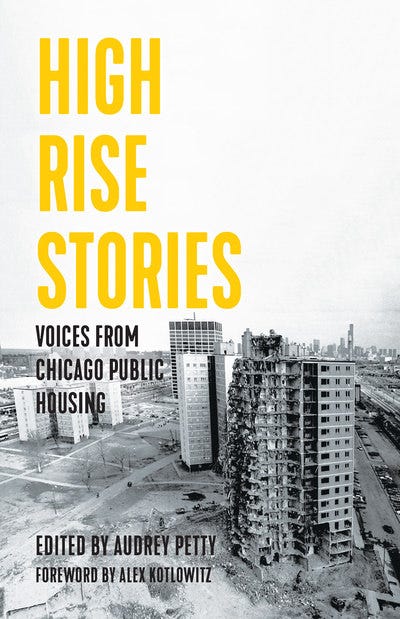Sometimes you read a book and it just changes you. Audrey Petty’s High Rise Stories: Voices from Chicago Public Housing changed me. I’ve been using it in a somewhat new class I teach at Tufts that I call “Introduction to Urban Studies”. The class is my attempt to connect first-year undergraduates to my home department and as a gateway to our minor in Urban Studies, the new class is a survey of the field and an orientation to some of the major debates and issues in the study of cities.
Instead of using a conventional “Intro to Urban Studies” textbook, I ask the students to read contemporary, compelling, and engaging books that cover a wide breadth of urban studies themes. This year, I assigned High Rise Stories, along with Cities for people (2010), Trespassers?: Asian Americans and the battle for suburbia (2017), American urban form: A representative history (2013). We have raucous debates and discussions around these fascinating books.
But High Rise Stories is special. Told in a series of oral histories, the book gives voice to public housing residents who were impacted by the 1999 Chicago Plan for Transformation that effectively bulldozed the city’s high-rise public housing. Through heart-wrenching and painfully honest accounts, we learn how complex a place the city really is. Through the narrators’ stories, we hear about public transportation, affordable housing vouchers, the prison-industrial-complex, gentrification, building codes, and much more.
Instead of using a conventional “Intro to Urban Studies” textbook, I ask the students to read contemporary, compelling, and engaging books that cover a wide breadth of urban studies themes. This year, I assigned High Rise Stories, along with Cities for people (2010), Trespassers?: Asian Americans and the battle for suburbia (2017), American urban form: A representative history (2013). We have raucous debates and discussions around these fascinating books.
But High Rise Stories is special. Told in a series of oral histories, the book gives voice to public housing residents who were impacted by the 1999 Chicago Plan for Transformation that effectively bulldozed the city’s high-rise public housing. Through heart-wrenching and painfully honest accounts, we learn how complex a place the city really is. Through the narrators’ stories, we hear about public transportation, affordable housing vouchers, the prison-industrial-complex, gentrification, building codes, and much more.
I’m writing this post because I was delighted to receive a grant from my School’s Diversity Fund and was able to invite the book’s editor, Audrey Petty, to come to campus, deliver a public lecture, and meet with my students. The Center for Humanities at Tufts, Tufts University Prison Initiative of the Tisch College of Civic Life (TUPIT), Shareable, and the Barr Foundation all helped sponsor the event that was hosted by Cities@Tufts.
This all happened last week and I couldn’t have been happier with the result: Audrey had us enthralled with her address and riveted during the discussions that followed. Our local campus newspaper, the Tufts Daily, covered her talk with this story: https://www.tuftsdaily.com/article/2023/09/audrey-petty-speaks-on-public-housing-at-citiestufts#
Thank you, Audrey, and everyone who helped make her visit possible!
All the best,
Justin






